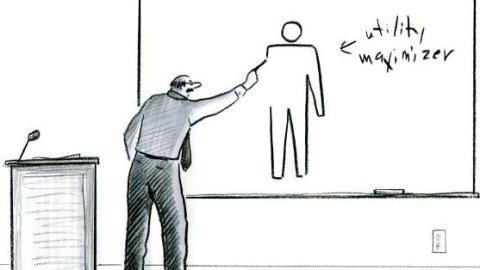Data vs. Stories: Incalculable Consequences

“Be suspicious of stories,” warns economist Tyler Cowen. Stories lower “your IQ by 10 points or more,” by seducing you into simplistic “good vs. evil” thinking.” Life is too messy to “filter” through the limited plots of stories, so Cowen relies on data and “a matrix of computation.” This story-versus-data frame is increasingly influential in our data-driven times.
But wait, isn’t economics full of simplifying, filtering stories? The free-market sort only have mono-motivated characters and a single plot, wherein self-interest guarantees the best of all possible outcomes. These homogenizing Utopian yarns of “econo-monism” ignore the “thousand other springs” that animate us, sometimes “counter to self-interest.”
Economics is also riddled with good vs. evil thinking and oversimplifying errors. Heroic saviors like competition guarantee no savings, sometimes increasing costs for all. Casting inefficiency as a sin obscures that it’s really a trait of processes, not a goal in itself. Is achieving a bad end, like destroying the ecosphere, more efficiently, necessarily good? Econo-monism’s stories lower IQs enough that “tragedy of the commons” logic seems rational. Can self-interest that is self-destructive be rightly rational?
Cowen fears that emotional seduction by stories usurps rationality, contributing to the everywhere evident comedy of “rational actors” acting irrationally. Econo-monism resolves this ambient anomaly by the “revealed preferences” subplot. An unconscious rational preference for that overpriced trinket was revealed by your buying it. In econo-monism, since we’re rational actors, all we do must have been done for rational reasons. That’s worse than jumping to conclusions; it’s jumping back to your own assumptions. Weak ideas that economists use among themselves needn’t worry us. But publicly preaching econo-monism’s parables can create bad pop-economics, like the history-defying faith that cutting taxes generates growth.
Cowen’s story-versus-data frame creates two risks. First data often isn’t simple or neutral. It needs, guess what, explanatory stories. Metrics can be amoral in physics, but social science data often aren’t value free (economics itself was once called “moral science”). Second, the story-versus-data frame dismisses whatever isn’t, or can’t be, captured in data. But “not everything that counts can be counted” (and vice versa).
Cognitive science is re-learning what the humanities have always known: “the human mind is a story processor.” To understand a thing is to have a story about it. Narrative and numbers are both powerful thinking tools. But the seeming objectivity and precision of data are limited. So be skeptical of claims that we can count on data and computations to add up to wisdom. Or we may risk incalculable consequences.
Illustration by Julia Suits, The New Yorker Cartoonist & author of The Extraordinary Catalog of Peculiar Inventions.





